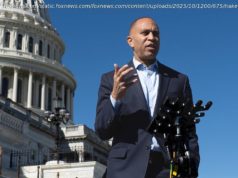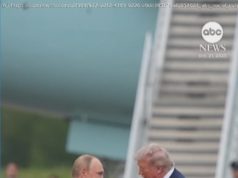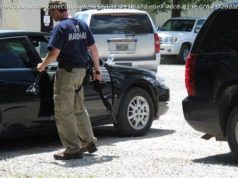They would have liked to prevent the gunman who shot up a Pittsburgh synagogue from getting guns in the first place, and they would have…
They would have liked to prevent the gunman who shot up a Pittsburgh synagogue from getting guns in the first place, and they would have liked to erase the hateful rhetoric before it inspired him to kill 11 congregants.
But the Jews, Muslims, Buddhists, Christians and nonbelievers who gathered on Sunday beneath the vaulted ceiling of Temple Emanu-El in San Francisco could do neither of those things. So they fought back by singing together. And by rejecting hatred and declaring what someone up there already knows: We’re all in this together.
“As your Muslim neighbors, we are here to offer our friendship and our brotherhood,” said Fatih Ates of the Pacifica Institute, an interfaith organization founded by Muslims, as he stood wearing a taqiyah cap at the synagogue’s bimah, or podium, and faced Sunday’s multi-ethnic congregation. “This is the time for coming together.”
Rev. Ronald Kobata of the Buddhist Church of San Francisco told the congregants that instead of gathering to “reject death, we are here to affirm being alive. To affirm the sense of oneness.”
“We need each other,” Rabbi Beth Singer said, noting that if such a tragedy had happened in the Muslim or Christian communities, “we are there. That’s what it’s all about.”
The interfaith service followed Saturday’s tragedy in Pittsburgh’s Squirrel Hill neighborhood. Police said Robert Bowers brought an assault rifle and other guns to a synagogue where three congregations — Tree of Life, Dor Hadash and New Light — held simultaneous services. Bowers has been charged with 29 criminal counts, including 11 counts of obstructing the exercise of religious beliefs resulting in death. Six others, including four police officers, were wounded. Bowers also faces state charges of criminal homicide. He has a history of posting anti-Semitic statements online, including blaming Jews for the migrant caravan making its way through Mexico.
At Temple Emanu-El, the line to enter the synagogue stretched around the block on Sunday, and the metal detector — usually deployed only for the High Holy Days in September, when attendance also fills the seats — had been activated. A pair of policemen kept watch, and security guards checked everyone’s bags.
Temple member Sonia Raich passed through the metal detector and pointed around the open courtyard, which wasn’t so open anymore. People used to be able to freely walk in from the Lake Street side, she said. But it’s been blocked off for nearly 20 years, since a gunman shot up the Los Angeles Jewish Community Center and wounded five people.
Also standing in line was Dawit Vasquez-Suomala, 16, of Richmond, a student at El Cerrito High. He said the way to stop mass shootings was not all that complicated.
“Gun control, of course,” he said. “It’s always control.”
San Francisco Mayor London Breed agreed with the teen. From the bimah, she called the massacre “a true act of evil, beyond comprehension.” And she said: “We have too many guns in our community.”
A cantor led the congregation in singing “Olam Chesed Yibaneh,” a world of love, after which congregants turned to one another to introduce themselves. One of them, Kelly Roberts, began to cry. She had lost a family friend, Dorwan Stoddard, who was 76 when he died shielding his wife from bullets in the Arizona mass shooting in 2011 that killed six people and wounded 13 others, including then-U. S. Rep. Gabrielle Giffords, D-Ariz.
“It’s all the same,” Roberts said through tears. “These people (in the Pennsylvania synagogue), the Pulse Nightclub, Aurora, Sandy Hook — how many more?”
The long list of mass killings in the U. S. includes a 1999 tragedy in Los Angeles, where a white supremacist walked into the Jewish Community Center with a semi-automatic weapon, fired 70 shots and wounded five people, including 16-year-old Mindy Finkelstein.
Now 35, Finkelstein faced the congregation on Sunday and spoke about the sense of love and family that being Jewish has given to her. How Saturday’s synagogue massacre brought her right back to being a teenager in one of the safest places she could imagine, and having her world torn apart.
She said she was stunned, though, at how perfect strangers — Jews from around the world — rallied around her in the aftermath of the shooting.
“That’s what got me through,” Finkelstein said. “Being a member of a community makes you stronger.” In addition to being Jewish, she said, “I’m an American. And I’m a voter.”
The applause was thunderous.






